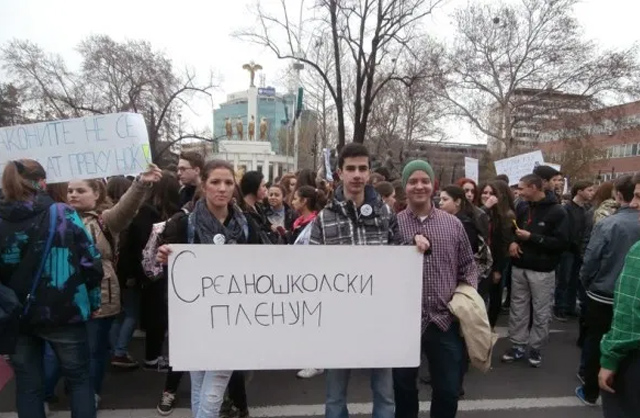The authorities do not respect the human rights of the young people
May 1, 2015

The Helsinki Committee and the First Children’s Embassy in the World – Megjashi, as organizations which had their representatives present on yesterday’s meeting, express their dissatisfaction with the unbecoming way the High School Students Plenum representatives were treated by high state officials.
Assuming the position of power, the Minister and the Deputy Minister of Education and Science, as well as the Deputy Prime Minister Vladimir Peshevski, attempted to discredit the High School Students Plenum by toying with the notions of “legitimacy”, “representivity”, “minority/majority”, as well as by presenting representative democracy as the only way of democratic activity. Their questions and comments made it clear that the authorities have no idea how to deal with horizontal structures which make use of activities characteristic of direct democracy. Often heard were rhetorical questions and comments, like: “Who are you?”, “You cannot talk on behalf of all students”, “Minority cannot make decisions on behalf of the majority!”, “You have no group, you have no representative! Point out your leadership! List your members! Whom are we negotiating with? Who have authorized you? Have you held elections?” “You should better organize your representativity system – what if tomorrow three other students turn up here?” “Have you got the mandate to make decision right now?” “Have you, or have you not authorization?” “What were your demands when you showed up for the first time?” “Who is the signatory on your behalf? On what basis?”
Although the meeting lasted for 1 hour and 15 minutes, the High School Students Plenum representatives managed to wrestle off only 20 minutes for expounding their demands, which is yet another proof of the authorities’ position of power. By conducting the discussions with the high school students in this way, the Government of the Republic of Macedonia and the Ministry of Education and Science breached the provisions of the Convention on the Rights of the Child, which in Article 12 foresees that every state should provide to a child which is capable of forming its own opinion the right to freely express that opinion with regard to issues that are of concern, paying to that child the due attention all the way through.
Noticeable were also subtle intimidations, to the effect that if the boycott continues, it will remain questionable whether the students would be able to receive their diplomas, while emphasizing that such statements should not be understood as threats. The pressure exerted on the high school students stand in opposition to the Constitution of the Republic of Macedonia, but also to all international standards, especially to the Convention of the Rights of the Child, which guarantees protection of the right to free association, expression and peaceful protest.
When it comes to the demands of the High School Students Plenum that the external testing results should not be part of the grading criteria in this academic year, the Government of the Republic of Macedonia and the Ministry of Education and Science concluded that such demand is unconstitutional, since some of the final year high school students had already taken the exams, and therefore no amendment in that area could be made.
I this context, we would like to remind the public of Article 52, Paragraph 4 of the Constitution of the Republic of Macedonia, where it is stated that laws and other regulations cannot have retroactive effect, except by exception, in the cases when such effect is more advantageous for the citizens. Therefore, the above statements are unfounded, since the highs school students are striving for changes to legislation which will be more advantageous for them, especially for the final year students.
At the same time we remind the public that, according to the Convention on the Rights of the Child, education is one of the basic processes where the children’s opinions should be heard and respected, and that the refusal to consider their opinion represents breach of the Conventions’ provisions. The high school students’ opposition to the external testing process is obvious. Furthermore, the external testing does not contribute to the improvement of the educational process, and therefore we hold that their demands in this area ought to be accepted. We fully support the students’ demands, acquiescing with their conclusion presented on yesterday’s meeting that “the external testing can not measure the love, passion and dedication of the students to certain school subject; the aim of the external testing is to transform us into statistics and numbers, and to make us learn that things are only a, b, or c.”


